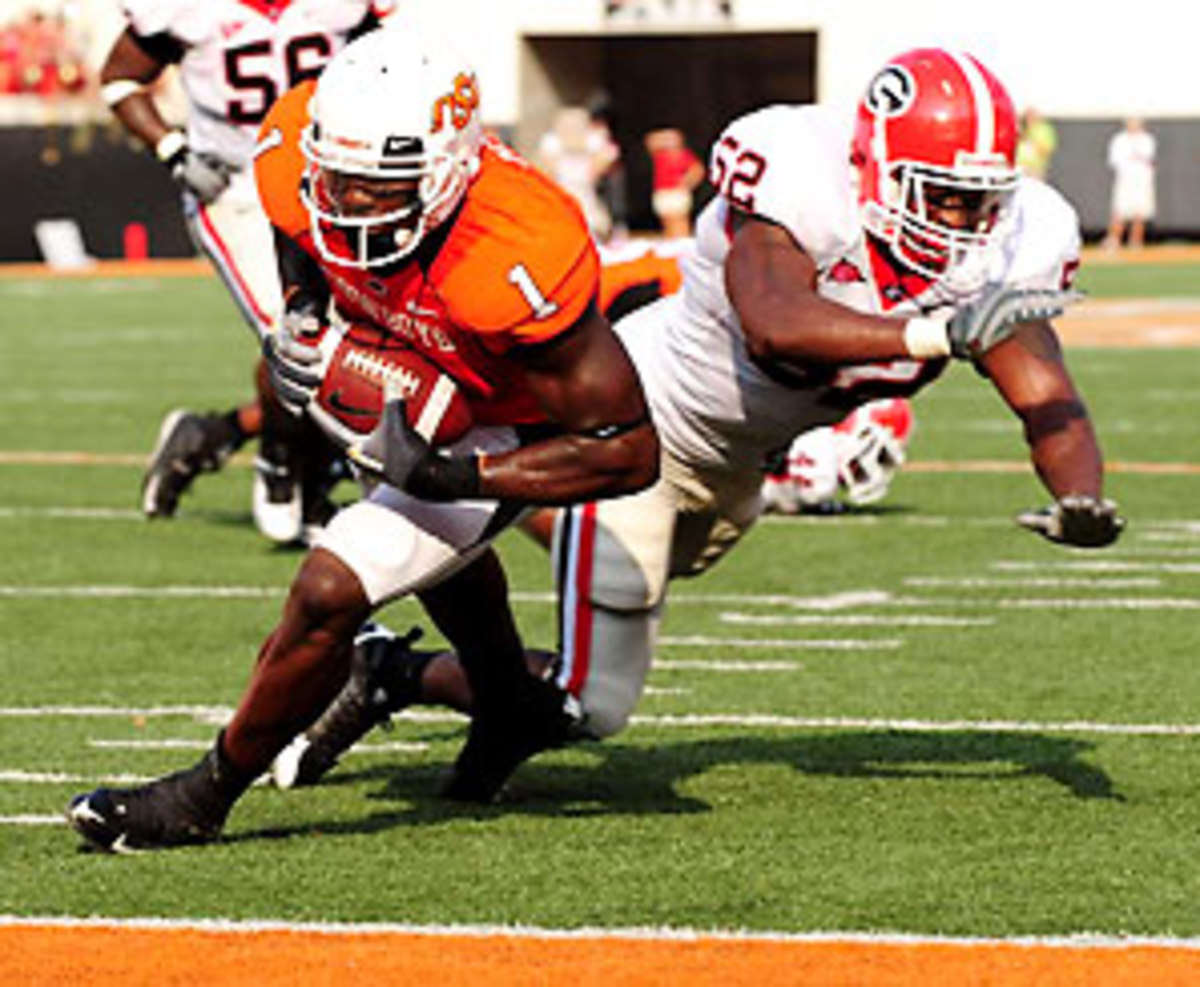Bryant, Bradford cases send message to prospects: turn pro
In the wake of the Dez Bryant ruling, Alabama linebacker Rolando McClain shouldn't have to make a decision after this season. In the wake of Sam Bradford's injury, West Virginia back Noel Devine should have his mind set.
If the past week has taught us anything, it's that a college football player with first-round talent should jump to the pros as soon as possible, or, in the case of a sophomore who has proven himself for two years, even sooner than that. The moment NCAA investigators and Oklahoma State compliance officials began asking Bryant questions about his offseason visit to Deion Sanders' home, Bryant should have politely said, "Thank you for your time, but if you need me, I'll be in Arizona training for the 2010 draft and living on my agent's dime."
As soon as a college player has a better than 50 percent shot of getting selected in the first round, he should shut it down. The aggravation isn't worth the thrill of a college career. Bryant might be the nation's best receiver. Had he been allowed to enter the draft after last season, he probably would have been a top 20 pick. Now, he's spent most of this season fighting the NCAA to regain his eligibility.
If this case is only about Bryant misleading NCAA investigators, the penalty was far too harsh. Yes, Bryant made a terrible mistake by lying. Yes, he let down his family and his teammates. But how many 20-year-olds would panic in the face of an authority figure and a byzantine rulebook? Plenty. Let's reserve the harshest punishments for the players who beat their girlfriends or settle arguments by whipping out AK-47s. If lying is the only mistake Bryant made, he has paid dearly.
Maybe there's more to this case than what we know. Maybe Bryant did something truly worthy of a one-year suspension. The point is he shouldn't even bother fighting. He's already done far more for Oklahoma State than Oklahoma State could ever do for him. He's still eligible to attend classes and receive a degree, and his future agent probably would fork over the tuition money if Bryant wanted to study between pre-draft workouts.
Why should Bryant fight the NCAA? Why should Bradford travel across the country on his parents' dime to have his shoulder re-examined? Why should Florida quarterback Tim Tebow endure criticism for every pass he throws, every carry that doesn't end up in the end zone and every press conference he doesn't attend? If the players are going to deal with this aggravation anyway, they should get paid for it.
Consider the case of Matthew Stafford. Had Stafford chosen differently, his Georgia Bulldogs would have faced off against Bryant's Cowboys on Sept. 5. Volumes would have been written about Stafford's courageous decision to forgo NFL millions to enjoy one more season in the pure, altruistic world of college football. (In case you were wondering, according to documents filed with the U.S. Department of Education, Georgia's football program brought in $67 million during Stafford's sophomore year.)
Instead, Stafford entered the draft. The Lions selected him first, guaranteeing him a lifetime of professional misery in exchange for $41.7 million in guaranteed money. After Uncle Sam and Stafford's various representatives take their cuts, Stafford probably will be left with $20 million, which is his even if his knee explodes tomorrow and he never takes another snap. Presuming Stafford doesn't meet some up-and-coming Bernie Madoff, his children's children's children will be set for life.
Let's face facts. Unless your last name is Kennedy or Bush, you probably went to college for one reason. You wanted to learn the skills to make a fairly lucrative living in a field you enjoy. Chances are, you sacrificed some of the fun you could have had in pursuit of that professional dream. If you're a cardiologist, you probably didn't want to spend every spare minute of your early 20s in a cadaver lab. If you're an accountant, you probably would have preferred to empty a keg when you were studying for the CPA exam. I know I didn't want to spend most of my last two years of college cooped up 18 hours a day in the dungeon that passed for an office at my school paper, but I did it so I might someday see my byline in Sports Illustrated.
Given the issues they face as they grow more famous and more potentially lucrative, elite college football players would be wise to make similar sacrifices. Maybe Alabama tailback Mark Ingram, a sophomore this season, would enjoy playing another two years at Bryant-Denny Stadium. Maybe there's a sociology class he's been dying to take. But wouldn't it be wiser, professionally speaking, to go into full-time draft prep mode after this season if Ingram finishes 2009 as the nation's best back?
Certainly, college coaches and NFL officials would encourage Ingram to play another year for the Crimson Tide, but how would that benefit Ingram? He'll be a target for unscrupulous wannabe agents. His every carry will be dissected. His flaws will be discussed weekly on ESPN. Why should he bother when we all know NFL people can't resist the siren call of one lights-out workout (see Mamula, Mike and Heyward-Bey, Darrius). That goes double for Ingram's teammate McClain, who will be eligible to enter the draft this season.
Players such as Bryant and Bradford already have given millions to their universities by playing well enough to keep the television and donor money flowing. They don't owe their schools anything. They don't owe the NCAA anything, either. So let this be a lesson, potential first-rounders. The moment you become a commodity, you should treat yourself as one.






